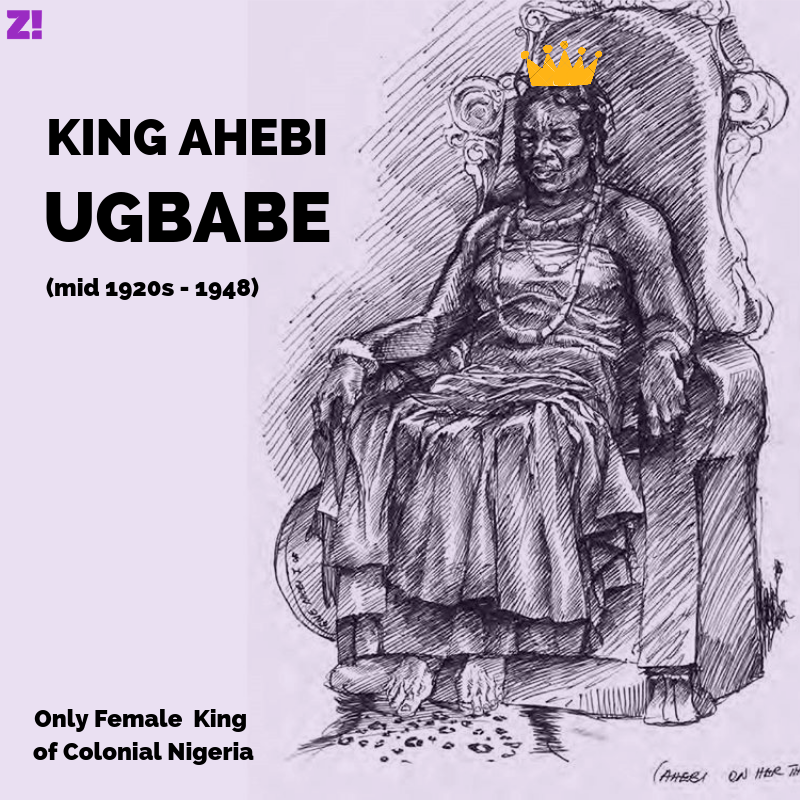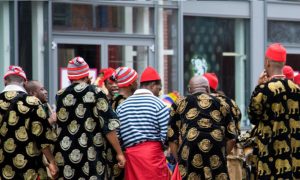
King Ahebi Ugbabe was the Eze (king) and warrant chief of Enugu-Ezike in Nigeria. Although, she passed away in 1948, In colonial Nigeria, she was the only female king. Nwando Achebe describes the effect of her life:
“She was a runaway, a sex worker, a headman, a warrant chief, and eventually a female king. She was also a “Slave” married to a deity. She was a capable leader of her people as well as a collaborator who benefited from and worked for Nigeria’s British colonial government.”
In the late 19th century, Ugbabe Ayibi, a farmer/palm wine tapper, and Anekwu Ameh, a farmer/trader, had Ahebi Ugbabe in Umuida, Enugu-Ezike, an Igbo settlement. She lacked sisters but had two brothers. She briefly resided in Unadu with her mother’s family before going back to Umuida. She did not stay long after her return before leaving. She had to flee to Igalaland.
Ahebi was evading a command that required her to wed a female divinity as atonement for her father’s transgressions. It was referred to as Igo ma ogo (to become the in law of a deity). Between the ages of thirteen and fourteen, her family had to deal with a string of unpleasant circumstances. The farm produced little, sickness quickly spread, and trade moved slowly. Her father had sought out a diviner, a person thought to possess knowledge of the unknowable. Due to his crime, this man had linked the occurrences to the goddess Ohe’s anger.
Ahebi worked as a commercial sex performer while she was in exile and took advantage of this career choice by forming alliances with strong men like the Igala monarch and British colonial officials. Ahebi acquired a variety of linguistic skills while she was on the road, including “Igala, Nupe, and Pidgin English. Her accomplishments and freedom made sex work in Igbo culture more acceptable and less of a slave trade.

Her sex job and linguistic abilities afforded her access to the Attah-Igala (king) and the British divisional officer, who not only permitted her return to Enugu-Ezike but also supported her claim to the position of headman, warrant chief, and eventually, Eze.
A few months after her return to Igbo land from exile, Ahebi assumed the throne. Ahebi took advantage of the British invasion of Igboland at the beginning of the 20th century by directing the invasion into her homeland of Enugu Ezike. The only person in her village who could communicate with the British was Ahebi. The British conquerors appointed her as the village headman as payment for her cooperation. She succeeded “the old (and increasingly incompetent)” headman, Ugwu Okegwu who was unable to connect with the British.
She was promoted to the position of warrant chief as a result of her effectiveness and steadfast allegiance, which went against the British policy of political exclusion for women in colonial Nigeria. Ahebi, according to British District Officer W. H. Lloyd, was “a strong and influential woman. She was thoughtful and reserved, and when she did talk, it was typically to the point and wise.”
With the help of the Attah (ruler) of Igala, who helped Ahebi Ugbabe ascend to the throne of Enugu-Ezike, her authority overflowed into Northern Igbo land and upended the gendered politics of her society. As a ruler, she embodied feminine masculinities and transcended all male political hierarchy and power. Despite having the respect of her people, Ahebi sowed the seeds of hatred by enlisting forced labor, conducting a census, and levying a British tax. Humans could not be numbered in Igbo society. The Woman’s War in southern Igboland was brought on by this census.
Due to her British support, “Ahebi swiftly quelled whatever resistance existed to her monarchy” . Ahebi accumulated wealth and power, but her multiple flaws, her gender, and her authority led to her downfall in the end. She went too far in her goal and further broke the rules by wearing her own mask to a spiritual masquerade rite. This rite was only for men. In a courtroom dispute between the male elders and Ahebi, the British sided with the male elders, undercutting Ahebi’s authority.
To reinforce the idea of an all-powerful reign, Ahebi Ugbabe fostered a mysterious aura. To promote this mysticism and hence power, she employed pre-colonial traditions. She also exploited this to enhance her gender, thereby making herself the monarch. Ahebi also used her extensive collection of wives—many of whom were fugitives from violent husbands—to further establish her masculinity. She could also rely on numerous servants. To carry on Ahebi’s name, these spouses would have children.
Ahebi completed her own funeral ceremonies before passing away. She did not have faith that her society would give her a respectable funeral. She vowed to carry out the ceremonies in such a wonderful way that her culture would never forget the existence of such a remarkable individual as herself. Gunfire, animal sacrifice, and music of remembering were all part of her living funeral.
1948 saw Ahebi’s passing. Despite being a woman, she was buried in accordance with the regional traditions for burial men. In her mother’s homeland, she is revered as a deity and is mentioned in a number of Enugu-Ezike songs and fables.


